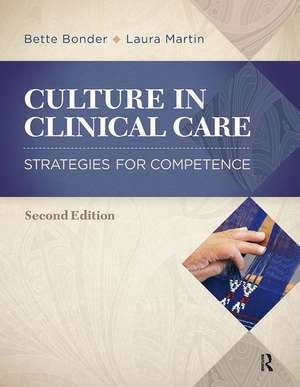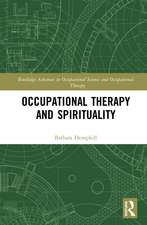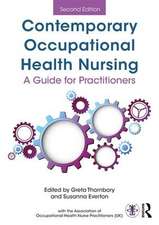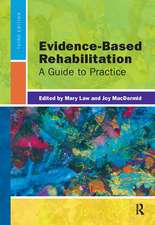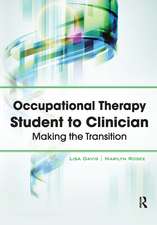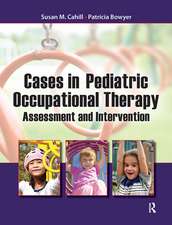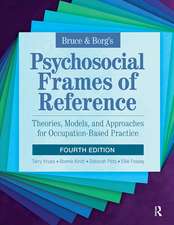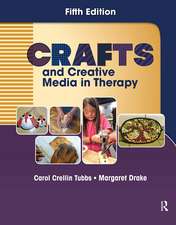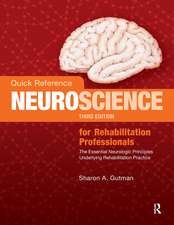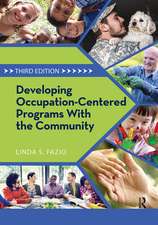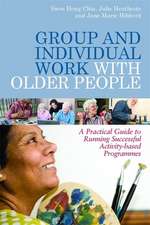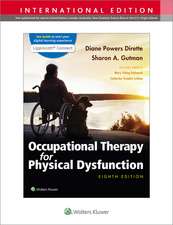Culture in Clinical Care: Strategies for Competence
Autor Bette Bonder, Laura Martinen Limba Engleză Paperback – 15 mai 2013
Based on ethnographic methods, strategies for culturally sensitive assessment and intervention are defined and illustrated, with ample opportunities for reflection and practice. Going beyond traditional fact-centered and attitude-centered approaches, Culture in Clinical Care, Second Edition describes the ways in which culture emerges as individuals interact with each other in physical and social environments.
This one-of-a-kind text by Dr. Bette Bonder and Dr. Laura Martin provides health care practitioners and students with chapter objectives, critical thinking questions, interdisciplinary case studies and examples, numerous activities to build observation and interaction skills, comprehensive references and online resources, and images. The book’s organization emphasizes practice and reflection by interweaving theory, examples, and continuous hands-on application of concepts. Readers have the opportunity to practice what they are learning and evaluate their own effectiveness while being constantly reminded that all individuals in any interaction embody numerous cultural influences.
Benefits of the updated Second Edition:
- Training and practice in ethnographic methods that build awareness and skill
- Numerous examples, exercises, and activities for reflection and observation
- Interdisciplinary approach suitable for cross-disciplinary teaching contexts
- Definition of health care professions themselves as cultures
- Web and bibliographic resources
- Case studies involving a wide range of practitioner disciplines and cultural groups
Instructors in educational settings can visit www.efacultylounge.com for additional material to be used in the classroom, including a sample syllabus.
Occupational therapists, physicians, physician assistants, mental health professionals, and a variety of related health professionals will benefit from this interactive, interdisciplinary text.
| Toate formatele și edițiile | Preț | Express |
|---|---|---|
| Paperback (1) | 604.73 lei 6-8 săpt. | |
| Taylor & Francis – 15 mai 2013 | 604.73 lei 6-8 săpt. | |
| Hardback (1) | 978.83 lei 6-8 săpt. | |
| Taylor & Francis – 4 noi 2024 | 978.83 lei 6-8 săpt. |
Preț: 604.73 lei
Preț vechi: 636.55 lei
-5% Nou
Puncte Express: 907
Preț estimativ în valută:
115.71€ • 120.82$ • 95.55£
115.71€ • 120.82$ • 95.55£
Carte tipărită la comandă
Livrare economică 15-29 aprilie
Preluare comenzi: 021 569.72.76
Specificații
ISBN-13: 9781617110405
ISBN-10: 161711040X
Pagini: 306
Dimensiuni: 216 x 279 x 23 mm
Greutate: 0.79 kg
Ediția:Revised.
Editura: Taylor & Francis
Colecția Routledge
Locul publicării:Oxford, United Kingdom
ISBN-10: 161711040X
Pagini: 306
Dimensiuni: 216 x 279 x 23 mm
Greutate: 0.79 kg
Ediția:Revised.
Editura: Taylor & Francis
Colecția Routledge
Locul publicării:Oxford, United Kingdom
Public țintă
Professional Practice & Development, Undergraduate Advanced, and Undergraduate CoreCuprins
Dedication Acknowledgments About the Authors Preface Foreword by Ashwini Sehgal, MD Prologue Chapter 1 Introduction: Defining Culture and Cultural Competence Chapter 2 Understanding Culture Chapter 3 Distinguishing the Cultural and the Social Chapter 4 Identifying the Personal Within the Cultural Chapter 5 Appreciating the Role of Culture in Health Care Chapter 6 Recognizing Cultural Differences: Lessons from Ethnography Chapter 7 Negotiating Cultural Differences in Working with Clients Chapter 8 Evaluating Clients and Designing Interventions in a Diverse World Chapter 9 Assessing Intercultural Interactions and Interventions Index
Recenzii
“The strongest part of the book is the development of skills and abilities of the ethnographic mindset: curiosity, imagination, empathy, etc., considering where one is positioned both physically and metaphorically in the encounter with other human beings, then having the capacity to take the ethnographic mindset into approaching assessment, client-centered goal setting, and intervention...Bonder and Martin’s book does an exemplary job of positioning the discussion of cultural competence outside a framework of a dominant culture that recognizes other cultures.”
- Carla Wilhite, OTD/L, OTR/L, University of New Mexico, Doody’s Review Service
“The authors’ desire for maximum engagement between the reader and the text is clear from the most cursory glance at the book. Each chapter begins with a clear list of learner objectives, while the numerous reflective questions provoke an enquiring reader to pause, reflect, be curious, and thus discover the nuances of their own cultural beliefs. The ancillary material accessible on the internet and the availability of an instructor’s manual make the book an appropriate resource for students and workshop participants; however, due to the interactive design, it would also be a valuable resource for any occupational therapy practitioner engaged in personal reflective practice.”
- Catherine Beynon-Pindar, Senior Occupational Therapist, The Retreat, York, British Journal of Occupational Therapy
- Carla Wilhite, OTD/L, OTR/L, University of New Mexico, Doody’s Review Service
“The authors’ desire for maximum engagement between the reader and the text is clear from the most cursory glance at the book. Each chapter begins with a clear list of learner objectives, while the numerous reflective questions provoke an enquiring reader to pause, reflect, be curious, and thus discover the nuances of their own cultural beliefs. The ancillary material accessible on the internet and the availability of an instructor’s manual make the book an appropriate resource for students and workshop participants; however, due to the interactive design, it would also be a valuable resource for any occupational therapy practitioner engaged in personal reflective practice.”
- Catherine Beynon-Pindar, Senior Occupational Therapist, The Retreat, York, British Journal of Occupational Therapy
Notă biografică
Bette R. Bonder, PhD, OTR/L, FAOTA, Professor of Health Sciences and Psychology at Cleveland State University, is an occupational therapist and psychologist with experience working with individuals from diverse backgrounds in mental health, gerontology, and developmental disabilities. She is currently serving as Special Assistant to the Dean of the College of Sciences and Health Professions for the NEOMED-CSU Partnership, a project that is directly applying some of the lessons found in this book.
Laura Martin, PhD, is Emerita Professor at Cleveland State University where she held multiple faculty appointments and served as Associate Dean, Anthropology Department Chair, and Director of a long-running public education program on Mayan culture. Trained as an anthropological linguist, she has taught and done research across several disciplines and has engaged in collaborative projects on topics ranging from anthropology and conservation biology to art history and migrant education. She held a Fulbright Fellowship in 2004 and has conducted workshops for teachers, health professionals, and researchers in the United States, Guatemala, and Mexico. She is currently a docent at the Cleveland Museum of Art, involved in a series of ongoing projects that combine art and medicine, and exhibits as a book artist.
Laura Martin, PhD, is Emerita Professor at Cleveland State University where she held multiple faculty appointments and served as Associate Dean, Anthropology Department Chair, and Director of a long-running public education program on Mayan culture. Trained as an anthropological linguist, she has taught and done research across several disciplines and has engaged in collaborative projects on topics ranging from anthropology and conservation biology to art history and migrant education. She held a Fulbright Fellowship in 2004 and has conducted workshops for teachers, health professionals, and researchers in the United States, Guatemala, and Mexico. She is currently a docent at the Cleveland Museum of Art, involved in a series of ongoing projects that combine art and medicine, and exhibits as a book artist.
Descriere
Culture in Clinical Care: Strategies for Competence explores theory and practice to define and describe the multidimensional nature of culture and its interaction with an individual's experience in the development of beliefs, values, and behavior.
